Key takeaways:
- Effective music band promotion relies on authenticity, storytelling, and knowing the right platforms to connect with the audience.
- Post-show reflection enhances performance by fostering self-assessment, accountability, and constructive feedback among band members.
- Analyzing audience engagement can provide valuable insights that influence future performances and connect deeply with fans.
- Creating actionable follow-up plans encourages continuous improvement and strengthens teamwork within the band.
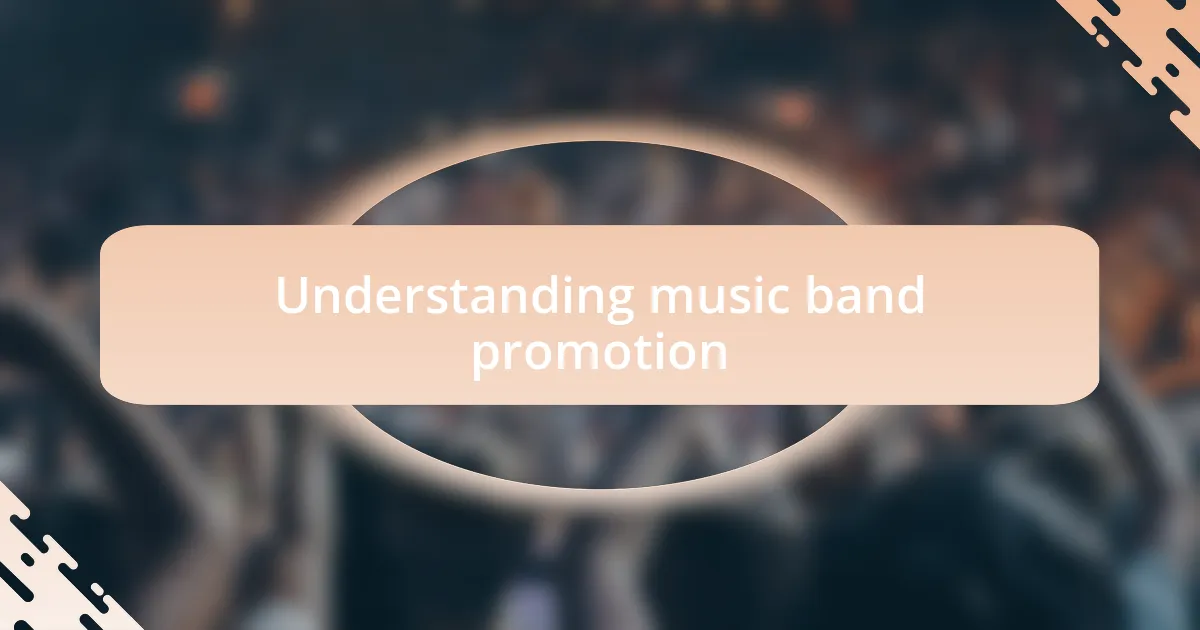
Understanding music band promotion
Understanding music band promotion goes beyond just sharing flyers or posting on social media. I remember the first band I worked with; we spent hours crafting their image and message to attract the right audience. This anecdote highlights that effective promotion requires a deep understanding of who your music resonates with and how to connect with them.
When I think about the essence of promoting a band, it becomes clear that authenticity plays a critical role. Have you ever come across a band that almost felt like a friend because of how they shared their journey? That’s the power of genuine storytelling in promotion. It creates a bond that can turn casual listeners into dedicated fans.
Moreover, music band promotion is also about utilizing the right platforms. I once assisted a local band that thrived on an unconventional platform, building a community that traditional outlets overlooked. This experience taught me that where you promote is just as vital as how—knowing your audience’s preferred spaces can make all the difference in your success.
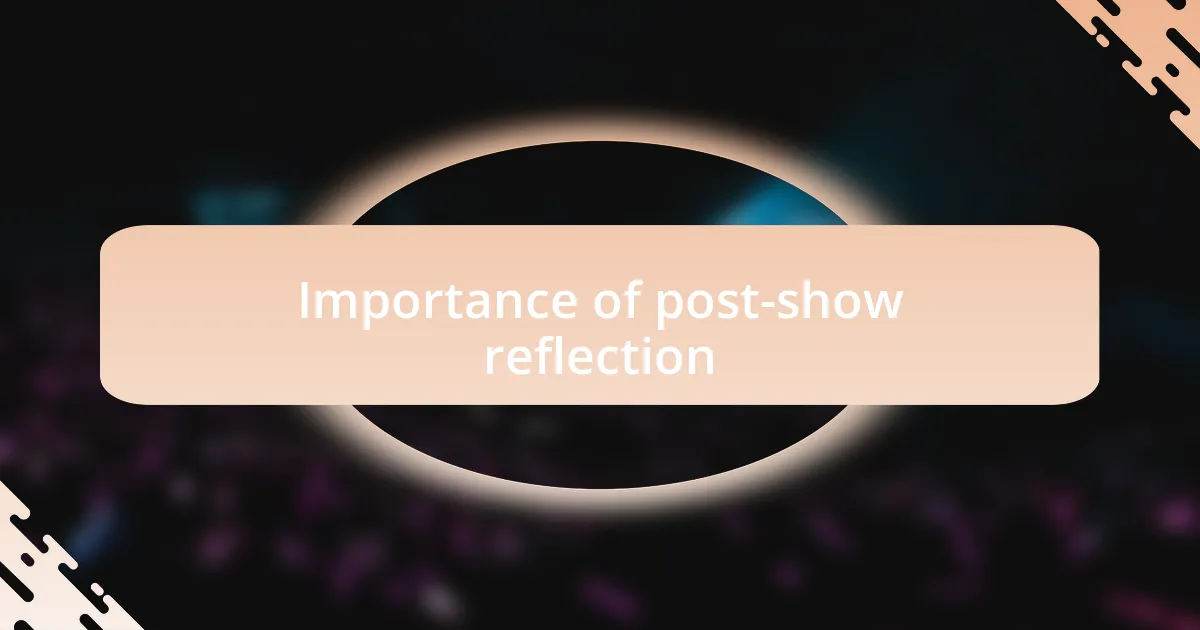
Importance of post-show reflection
Reflecting after a show is crucial for any band striving to grow and connect with their audience better. I once watched a band practice their post-show debriefing, where they openly discussed what worked and what didn’t. This collaborative spirit not only strengthened their dynamic but also led to significant improvements in their performances. It reinforced my belief that self-assessment fosters creativity and growth.
Have you ever left a gig feeling a mix of excitement and uncertainty about how the audience perceived you? These emotions are natural, and that’s where post-show reflection comes in. By evaluating audience reactions and personal feelings, bands can gain valuable insights that could directly influence their future shows. I’ve found that noting specific moments from the performance—like a standout solo or a crowd-pleasing song—can help in crafting more impactful performances down the line.
Additionally, I can’t stress enough how reflection encourages accountability within the group. I remember a time when a band member felt they hadn’t contributed enough to the energy of a live set. After some candid discussions, it became clear that understanding individual strengths and areas for improvement mattered immensely. This realization not only enhanced our performances but also built a strong sense of trust among the musicians, making the journey even more rewarding.
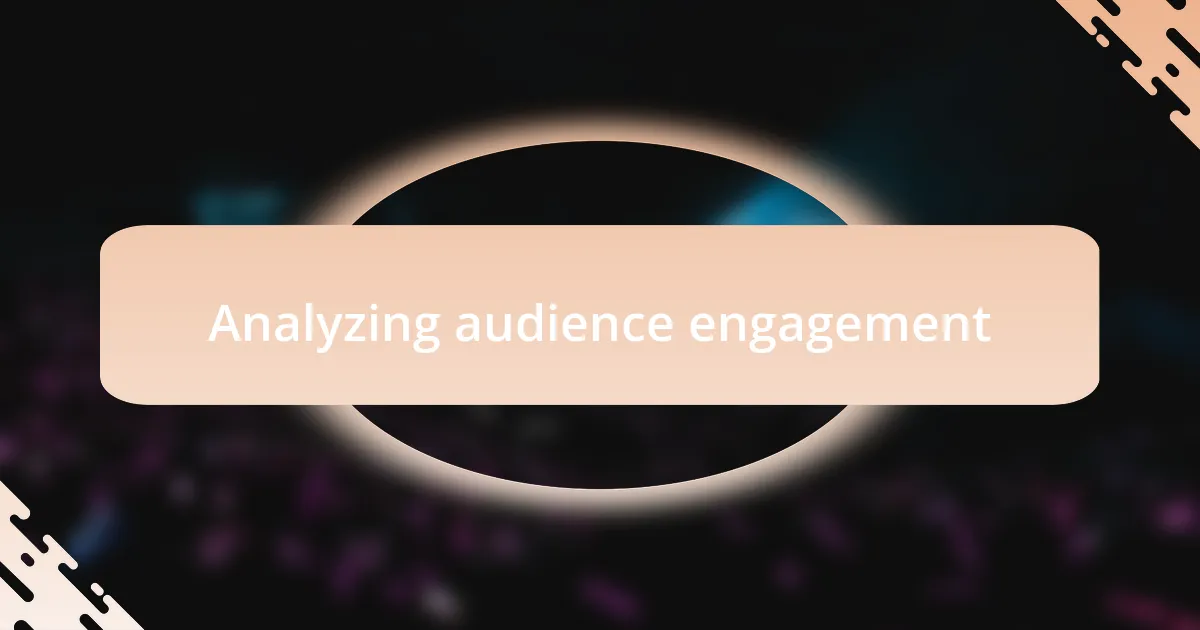
Analyzing audience engagement
When analyzing audience engagement, I’ve learned that the energy in the crowd can be an invaluable gauge of a show’s success. I recall a performance where the audience response felt electric—people were dancing and singing along. It was clear that our set list clicked with them, and this feedback spurred us to tailor our future songs similarly. Isn’t it fascinating how the connection with the audience can shape a band’s direction?
During a recent gig, I noticed several fans filming and capturing moments on their phones. This felt like a double-edged sword: on one hand, it showed enthusiasm; on the other, I couldn’t help but wonder if they were experiencing the music fully. Reflecting on this sparked a discussion within the band about striking a balance between creating memorable experiences and ensuring the audience connects with the live energy. How often do we stop to think about what our performance looks like from the crowd’s perspective?
Furthermore, I find that gathering direct feedback can illuminate aspects we might overlook. After one show, I asked a few attendees what they enjoyed most. Their responses not only surprised me but also opened doors to fresh ideas for our next performance. Engaging directly with the audience like this turns a one-sided experience into a conversation, allowing us to evolve in ways that truly resonate with the people who matter most: our fans.
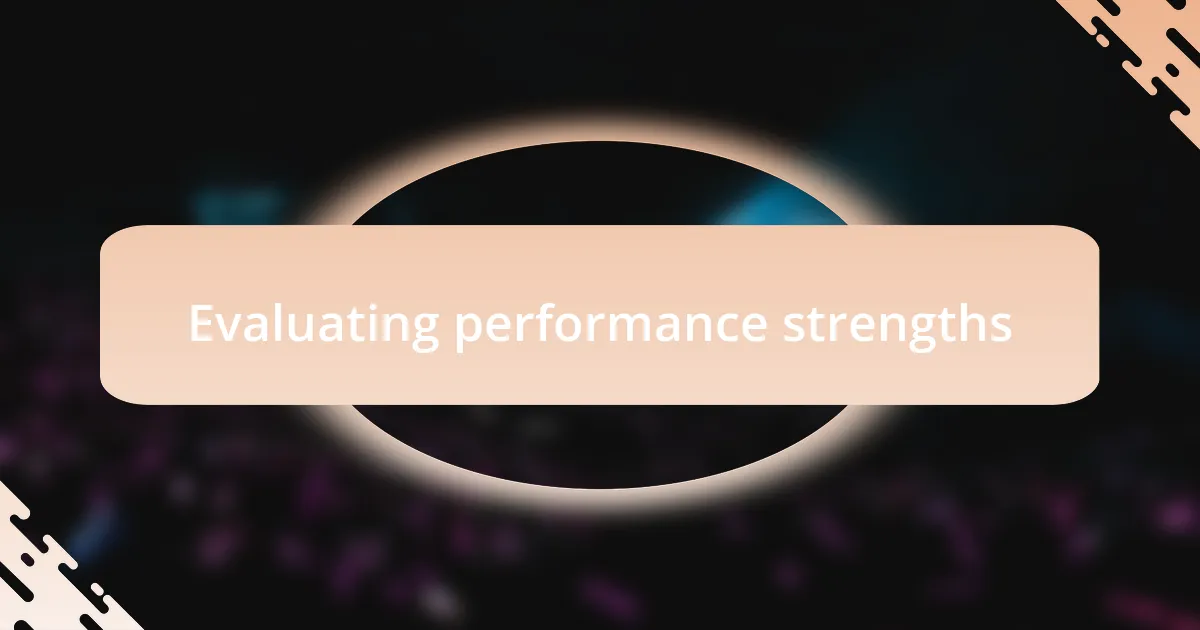
Evaluating performance strengths
When evaluating performance strengths, I often reflect on the moments when everything clicked effortlessly on stage. There was a time during a show when I felt completely in sync with my bandmates; our musical chemistry created a sound that captivated the audience. That experience taught me that our strengths lie not just in individual talent, but in how well we work together as a unit.
One particular instance stands out: during a high-energy song, I could see the drummer and bassist communicating with subtle nods and smiles, enhancing the entire performance. It made me think about how vital nonverbal cues are in a live setting. Are we consciously nurturing this dynamic energy? When we play off each other’s strengths, it elevates the overall performance and enhances the audience’s experience.
There’s also something to be said for mastering our instruments. I remember the pride I felt after a solo that really showcased my progress, receiving enthusiastic cheers from the crowd. That moment reinforced my belief that honing our skills doesn’t just benefit us; it creates a richer atmosphere for our fans. So, how are we continuously setting goals to improve? After all, each performance is an opportunity to showcase our strengths and keep evolving as artists.
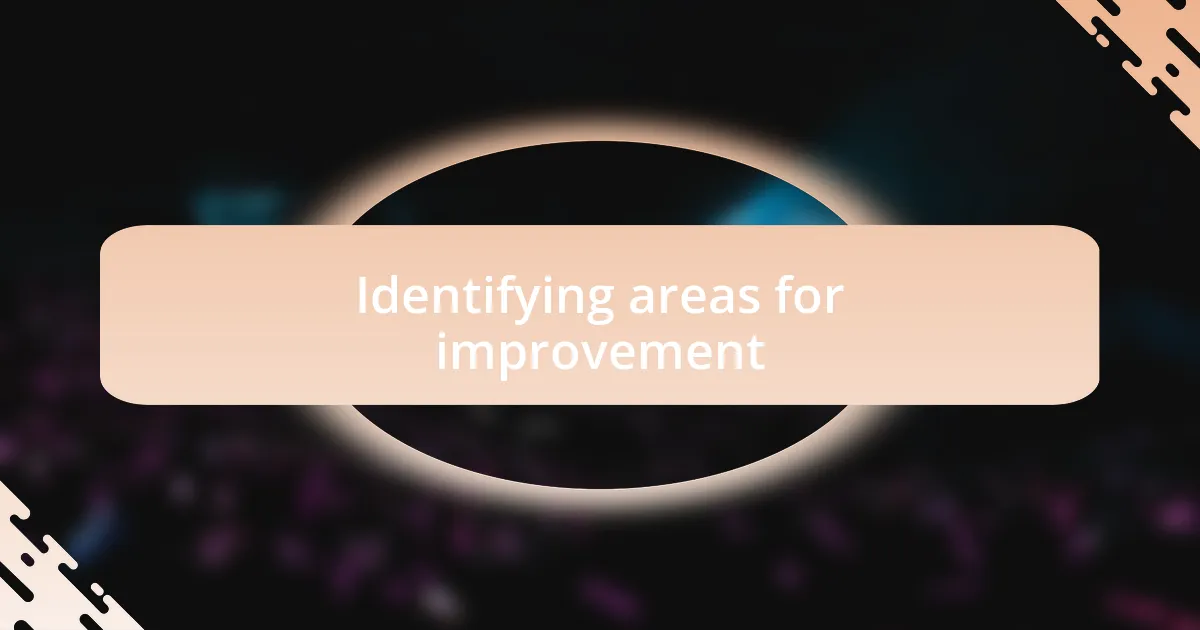
Identifying areas for improvement
Identifying areas for improvement can often feel like unearthing hidden treasures within our performances. I vividly recall a show where I noticed our transitions between songs felt rushed, leading to a disconnect in the set’s overall flow. That experience pushed me to think: how can we create a seamless journey for our audience? It’s moments like these that remind me of the importance of pacing and preparation; even small adjustments can elevate the entire concert experience.
In another performance, I felt the band’s energy waning midway through the set. I took a moment to look around and realized I was the only one fully engaged. This propelled me to consider how my enthusiasm impacts the rest of the group. Are we actively engaging with each other during performances? My takeaway was clear: maintaining energy and presence on stage requires a collective effort, and we need to cultivate that atmosphere as a team.
I’ve also learned that seeking feedback is crucial in identifying blind spots. One time, after a gig, a trusted friend pointed out that our harmonies weren’t as tight as they could be. Initially, I felt defensive, but soon I recognized that constructive criticism is a gift. It made me question: How often are we inviting others to share their perspectives? Embracing that feedback can transform an okay performance into something truly spectacular, allowing us to grow not just as individuals, but as a cohesive band.
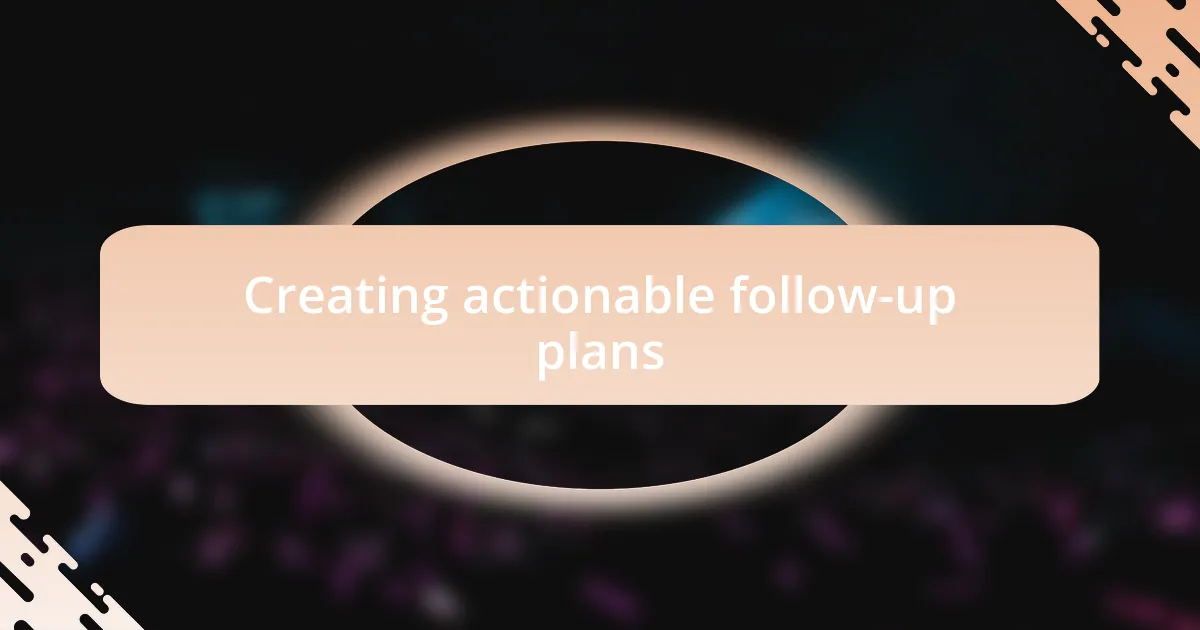
Creating actionable follow-up plans
Creating actionable follow-up plans after a show is essential in ensuring continuous improvement. I remember after one performance, we gathered to discuss what went well and what didn’t over a cup of coffee. It was enlightening to hear my bandmates’ perspectives, and together, we laid out specific steps to address the issues we’d identified. Have you taken the time to sit down with your bandmates and create a structured plan that everyone agrees on?
I often find that writing down our actionable follow-up steps keeps us accountable. For instance, we once decided to dedicate our next rehearsal entirely to perfecting our set transitions. Not only did we become more aware of our timing, but the exercise created an environment where we all felt invested in the outcome. How often do you treat rehearsal as an opportunity to refine specific aspects rather than just run through the set?
Ultimately, tracking our progress is key. After implementing our follow-up plans, I would regularly ask the team, “How are we feeling about these changes?” It’s remarkable how keeping the lines of communication open can strengthen our bond. Do you have a system in place to reflect on your initiatives? By continuously assessing our actionable plans, we ensure that improvement is not just a one-time effort but an ongoing journey.
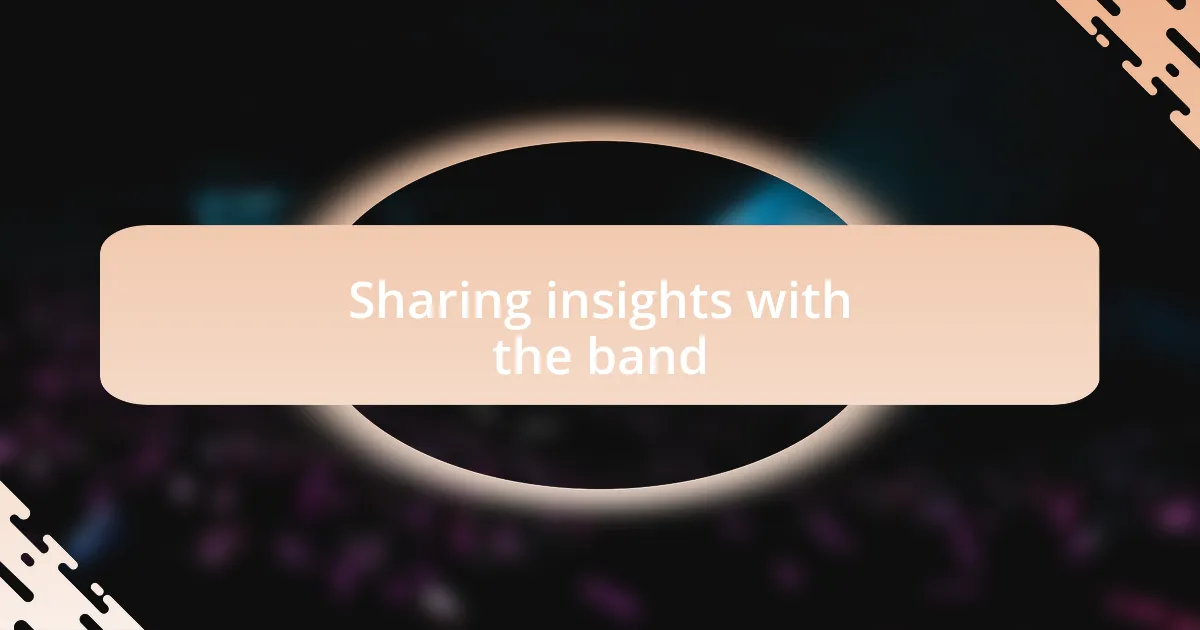
Sharing insights with the band
Sharing insights within the band can be a transformative experience. I recall a particular night after an electrifying performance when our lead guitarist shared his feelings about how the energy in the room resonated with our music. It was fascinating to hear how his perspective added depth to my own understanding of our audience’s reactions, showing just how crucial it is to create a space for open dialogue. Have you ever noticed how much deeper your connections can grow when everyone feels comfortable sharing their thoughts?
Engaging in these discussions isn’t just about analyzing what happened; it’s about fostering trust and understanding. I remember a time when I shared my struggle with stage fright, and instead of brushing it off, the band rallied around me. Their support not only helped me overcome my fear but also solidified our bond. How does your band navigate personal challenges during this post-show conversation?
In my experience, moments of vulnerability often lead to the most meaningful insights. After one show, we found ourselves discussing not only the performance but also personal growth. It became clear that each of us had unique battles, and by simply sharing our experiences, we became more cohesive as a unit. Aren’t those conversations the heart of what makes a band feel like family?